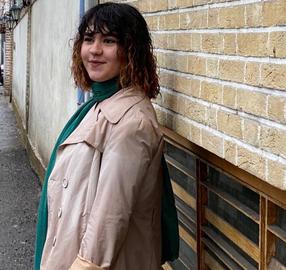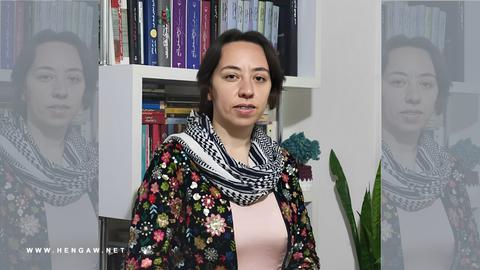Those who have read Jane Austin’s Pride and Prejudice or fairytales by the Brothers Grimm or the stories of One Thousand and One Nights in fluent modern Persian surely remember the name of Shams ol-Moluk Mosaheb on the cover of these books. She was not only a poet, a woman of letters, an art critic and a translator, but also one of the first two women who served in the Iranian Senate. She was also an activist for women’s rights and against illiteracy.
Born in Tehran in 1913, Mosaheb was the third child of Mohammad Ali Mosaheb, a politician and man of letters originally from the city of Naeen in Isfahan. The Mosaheb family achieved fame in the town’s literary and intellectual circles in the Safavid era (early 1500s until early 1700s). Shams ol-Moluk Mosaheb’s great grandfather, Mullah Mosaheb, was one of Shah Abbas the Great’s court poets, and her grandfather Mirza Gholam Ali was a physician and a poet. Mosaheb’s mother also wrote poetry.
One of Mosaheb’s sisters, Ashraf ol-Moluk, was a physician. Her brother Gholam Hossein Mosaheb was the founder of the well-respected Institute of Mathematical Research and also co-authored a comprehensive Persian Encyclopedia.
Teacher, Principal, Translator and Senator
Mosaheb finished her primary education at Namus School, attended the Higher Teacher Training College and then studied Persian Literature at Tehran University, as one of the first women to attend the university. She began studying for a doctorate in 1941, just as the United Kingdom and the Soviet Union invaded and began their occupation of Iran. She successfully defended her thesis - on Iranian poetry from the Arab Invasion of 651 up to the Mongolian Invasion of 1219 - and in 1945 became the first Iranian woman to obtain a PhD in Persian Literature.
After graduating Mosaheb went to Canada and the United States to work toward a second doctorate, this time in education, and studied at Laval University in Canada, and the Universities of Indiana and Florida in the United States. Upon returning to Iran she took up a teaching role at Tehran University and later went on to become the principal of three important girls’ high schools in the capital: Parvin, Shahdokht and Nourbakhsh. During her years as a principal she oversaw the publication of the monthly Rural Life. In addition she served as director of the government’s Higher Education and Teaching Training department.
Mosaheb then began work at the Ministry of Culture, starting out in an administrative role and then working for the ministry’s Office for Rural Culture. She went on to become deputy minister of education, focusing specifically on literacy. After her time working in the ministry she was appointed by the Shah to the Senate in 1963. She served 17 years as a senator and at the same time oversaw the cultural department of the Shah’s charitable Pahlavi Foundation.
In 1960 Mosaheb wrote a popular children’s book with Abbas Yamini Sharif. The book and its famous characters Dara and Azar became an important part of Iranian children’s literature and education of the 1960s.
Mosaheb was a poet and composed a total of five thousand verses, but although her poems, including “Mother's Gift,” “Broken Harp” and “Loving Beloved” appear in books commemorating the lives of influential Iranian figures, no stand-alone volume of her poetry has been published. She was, as we said, also an accomplished translator.
A Champion of Women’s Rights
Mosaheb was an advocate for women’s rights, and she championed the right to vote in particular. As a member of the Women’s Organisation from the mid-1950s she wrote tirelessly and gave public lectures on the subject.
In an article about the social status of women, while defending the ban on wearing the veil (which Reza Shah Pahlavi had ordered in 1936), she wrote that the majority of problems women faced were due to the fact that men and women do not really know one another: “Our men still talk about their shortcomings, their ordinary life problems and their vocational, artistic, family, and marital issues solely to their male friends and leave their family or wives to have ‘feminine’ talks with their own friends. The spouse of a lawyer, a minister, an engineer, a university lecturer, a physician, etc., knows little about her husband’s life.”
Mosaheb, like many advocates working for gender equality, knew that women had a long way to go to achieve their goals, and that they would endure numerous hardships along the way. But she strongly believed that empathy and understanding between the genders was an important first step in the process.
The Islamic Revolution of 1979, of course, put an end to the hopes of Mosaheb and other Iranian women. After the revolution she was arrested for having been a senator under the Shah but was soon released after prominent cultural figures and even some officials of the newly-established Islamic Republic intervened.
While in prison she was cellmates with sex workers who had been put behind bars in the Islamic Republic’s drive to “clean” society. “When I entered the prison these poor women gathered around me, as is the habit of prisoners, and asked me why I had been arrested and imprisoned,” she said later. “I said ‘I was a senator and they have arrested me for the crime of having been a senator.’ A few of them shook their heads in sympathy and said: ‘At least you have committed a crime but why have they arrested us? We had permits from the police and a certificate of health from the Bureau of Health. We didn’t do anything illegal to be arrested and imprisoned!’
“These poor women, most of whom were executed by firing squad a few days later, believed that being a senator was a greater crime than prostitution.”
Mosaheb died in 1997, at the age of 84, after a fruitful life.
visit the accountability section
In this section of Iran Wire, you can contact the officials and launch your campaign for various problems
























comments